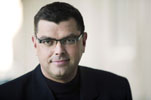 |


|
 |

Is funding reserved for highbrow culture and art only? Should we subsidize the growth layer of modern music and its mass of talent on equal terms with film, theatre, and the fine arts? What’s the purpose of funding? When funding Danish music, who are to have a share in the money? What is the significance of the growth layer and upcoming music in relation to the music industry? Three politicians, a musicology researcher and an A&R manager take part in the debate.
 Mogens Jensen Mogens Jensen
Mogens Jensen is the Social Democrats’ spokesman on culture. He recently took over Poul Nyrup Rasmussen’s seat in the Danish Parliament. Incidentally, it was his parodies of Nyrup that made him famous 10 years ago. He has been involved in politics for 25 years not least in the trade union LO – as a consultant with promotion, campaigns, culture, and sponsorship among his fields of responsibility. He is on the board of several cultural institutions.
 Christian Backman Christian Backman
Christian Backman is the Artist & Repertoire-manager at Copenhagen Records. Previously, he worked at EMI/Medley signing acts such as Carpark North and Saybia. In the beginning of 2004, however, Copenhagen Records was formed by Jakob Sørensen, Nick Foss, Mik Christensen, and Backman, all of whom came from EMI/Medley. Among the prominent acts at Copenhagen Records are Nephew, Bikstok Røgsystem, Angu, and Kira & The Kindred Spirits.
 Søren Bojer Nielsen Søren Bojer Nielsen
Søren Bojer Nielsen is member of the Danish Arts Council and is chairman of the Council’s Music Committee. He is among the decision-makers when it comes to governmental funding of music – last year, from a total of 200 million kroner reserved for all the arts, music received 71 million kroner. He is also the orchestra leader of Sealand Symphony Orchestra – previously he has been employed as producer and manager of other symphony orchestras.
 Ellen Trane Nørby Ellen Trane Nørby
Newly elected MP Ellen Trane Nørby is the spokesperson on culture of Venstre Denmark’s Liberal Party. The 25-year-old politician is studying art history at the University of Copenhagen. Her ten-year political career includes working as political secretary for an MP, but European politics are closest to her heart: from 1999 to 2004 she was on the board of LYMEC – The European Liberal Youth – two years as president.
 Henrik Marstal Henrik Marstal
Besides playing the bass in the pop band ibens, Marstal is an MA in musicology, a lecturer and the author of several thought-provoking books on music. Thus, in 2002, came “Alt hvad musikken kan” on the potential of music, and in 2003 together with Morten Jaeger, he published “Hitskabelonen” on the standardisation of pop music, which attracted a lot of attention due to its critical stance to the means and objectives of pop music.
 Lill Rasted Bjørst (moderator) Lill Rasted Bjørst (moderator)
Lill Rastad Bjørst is a singer, a guitarist, and the president of Rhythmic Music Denmark. Having excelled in jazz and folk, she has now turned to the alternative Danish-language rock with her band Siku. In the mid-nineties, she was among the founders of the association Copenhagen Live. She was also involved in the Nordic/Balkan project Wired. A student at the University of Copenhagen, Bjørst is writing her thesis on culture and communication. |
|
|
 |

|

